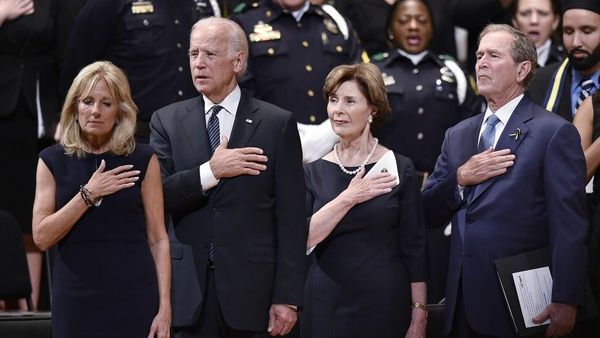Last night Bernie Sanders dropped out of the US presidential race. Joe Biden, Barack Obama’s VP, is now the presumptive Democratic nominee and the man who will almost certainly face Donald Trump in the upcoming 2020 US presidential election.
A few minutes after the announcement by Sanders, I spoke with Branko Marcetic, the author of Yesterday’s Man: The Case Against Joe Biden. Tracing Biden’s political maneuvering from his election to a county council Democrat in 1970 to Trump’s victory at the 2016 election, Marcetic sees Biden as a man who, the book argues, “made choices and drew political lessons that not only make him ill-suited to combat Trumpism but led him to help engineer the very conditions that handed Trump victory in the first place.”
Marcetic sees Biden as a man who, the book argues, “made choices and drew political lessons that not only make him ill-suited to combat Trumpism but led him to help engineer the very conditions that handed Trump victory in the first place.”
What kind of a politician is Joe Biden? “The big element of his career early on was that he was against busing,” says Marcetic. Busing was an initiative that sought to transport black, and occasionally white, students to schools outside of their neighborhoods in order to facilitate racial integration. Biden joined his Republican counterpart from Delaware, William Roth, and pushed legislation forward to stop it.
But Biden’s views against anti-segregationist policies had further implications. Marcetic told me that “Biden played a role in undermining civil rights more generally. He also ended up drawing votes from anti-segregationist senators for the first time. So, it was actually printed at the time by publications as being the thing that shifted things away from the steadfast support for anti-segregationist measures.”
His stance against busing became prominent last June in the Democratic primary debates. Senator Kamala Harris bought up Biden’s work against racially integrating schools in the 1970s. Pointing out that Biden had worked with segregationist senators, Harris said that “there was a little girl in California who was part of the second class to integrate her public schools and she was bused to school every day. And that little girl was me.”
“Biden has been on the wrong side of history for almost everything you can think of; from social issues to war, to economics, to criminal justice. The list goes on,” Marcetic says.
But Biden’s opposition to policies which sought to increase integration and break-down racial divide in America is not the only time his politics have drawn criticism. “Biden has been on the wrong side of history for almost everything you can think of; from social issues to war, to economics, to criminal justice. The list goes on,” Marcetic says.
In Yesterday’s Man Marcetic notes how Biden opposed Bush’s foreign policy before the September 11th attacks. But after the attacks, and once Bush’s approval ratings had hit 90 percent, Biden told the press it could “count me in the 90 percent.” Insisting that there was unity between the Democrats and the president on the issue, Biden continued by saying that there was “there is no daylight between us.” The White House even installed a special secure phone line to the home of Biden, who by that time had become the top Democratic pro-war voice.
Again, however, Biden has attempted to distance himself from his now-unpopular record. Earlier this year Biden was asked by an audience member about his voting in favour of the war in Iraq. But Biden said that "I opposed what [Bush] was doing and spoke to him."
Insisting that there was unity between the Democrats and the president on the issue, Biden continued by saying that there was “there is no daylight between us.”
In reality, Biden made supportive statements for the war both before and after it had begun with Operation Shock and Awe. Donald Trump grew support for criticism of the trillions of dollars spent on post-9/11 wars, Biden’s support for such wars will become prominent in the debates and in the media in the coming months.
“Biden voted for Afghanistan. He led to charge in the Iraq war. He led the charge in other wars. It does contrast to Trump’s record. Trump, even though he’s expanded military action and he’s tried to start a war with Iran and failed and tried to start various coups, for example, Venezuela, at the same time he’s not led the US into a new war. By my count, it’s something like forty years, the first president in 40 years not to start a new war. That record will be a big contrast to Biden’s record who not only led the charge to war in Iraq which is the worst foreign policy disaster of the twenty-first century but Biden was advocating for war through the 2000s and the ’90s,” says Marcetic.
On other issues, Biden has “tried to out-flank the right,” as Marcetic tells me. This includes his policy on Israel. “At the very beginning of his career in 1972 there was a person working on Biden’s campaign who came out and said that Biden said: ‘I don’t have any real views on Israel. Whatever stance I take now on Israel is the one I will take for the rest of my life.’ This has been a very positive view. No matter what the Israeli government does, they can rely on Biden,” says Marcetic.
This has been a very positive view. No matter what the Israeli government does, they can rely on Biden,” says Marcetic.
It is hard to tell if Biden’s policies in the Middle East are likely to differ from Obama’s or the Republicans before him. Similarly, Biden’s position on how to tackle COVID-19 is unclear. But Marcetic believes it will not involve big spending: “It’s written into his political DNA that he cannot advocate for any major government programmes. We’ve seen that with the coronavirus.” This could make it very difficult for Biden to criticise Trump in upcoming debates which will inevitably touch on Trump’s poor handling of the coronavirus crisis.
A poll commissioned by The Economist and conducted between 5 April and 7 April by YouGov shows that Biden is leading Trump with 48% against Trump’s 42%.
A poll commissioned by The Economist and conducted between 5 April and 7 April by YouGov shows that Biden is leading Trump with 48% against Trump’s 42%. Nevertheless, as the campaigns rally up, questions will be asked of Biden’s links to corruption, sexual assault allegations, and his support for past wars. Though Trump has his own issues with two of the above, it could be wars in the Middle East and elsewhere which keep Trump in the White House.
The views expressed in this article do not necessarily reflect those of Al Bawaba News.







